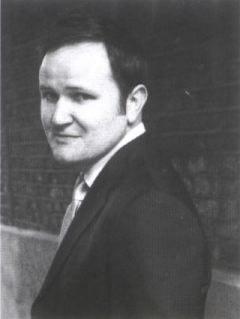Don't Look (It Up) Now

Charles McGrath recently reviewed Defining the World: The Extraordinary Story of Dr. Johnson's Dictionary in the New York Times Book Review. Dr. Johnson's dictionary, of course, is something of a ground zero in the history of English-language prescriptivism, and McGrath indulges in a little prescriptivism himself in the review, wisecracking that Henry Hitchings, the book's author, "is an inventive and entertaining guide . . . despite needing to do a little more dictionary work himself (he seems to think that 'perusal,' for example, is a synonym for 'skimming') . . ."
Hitchings (pictured), an Oxford-educated man who, according to the book's back flap, wrote his dissertation on the world's most famous dictionary writer and has now written a book about the making of said dictionary, needs to do "a little more dictionary work." Harsh.
Now, I found this to be a jarring note in an otherwise friendly review, and my first thought was that McGrath's statement was a typical example of a certain kind of dogmatic complaint about word usage, in which the complainer objects to a common (but relatively new) usage that violates what the complainer takes to be the old, established, and correct usage. A frequent problem with this sort of complaint is that often the new, "bad" usage is so widespread that there is very little justification for saying that it is wrong. The complainer often seems to want to revert the language to some previous, ostensibly purer state or, at the least, prevent it from changing from its current state.
Meanwhile, I suspected that if I did a little dictionary work myself, I would find that the word perusal can in fact mean "skimming." And, lo and behold, Merriam-Webster's Dictionary, has this under "peruse":
1 a : to examine or consider with attention and in detail : STUDY b : to look over or through in a casual or cursory mannerGood news for Hitchings! Definition "1b" is basically "to skim," which is what McGrath reprimands Hitchings for thinking "peruse" means. So maybe Hitchings did do a little dictionary work. But is that enough? After all, McGrath says he should have done "a little more." So, accordingly, I took a look at another source, the American Heritage Dictionary.
2 : READ; especially : to read over in an attentive or leisurely manner
Bad news! There's no sign of anything like "to skim" in its definition:
To read or examine, typically with great care.And then it gets worse. Under the definition is this usage note:
Peruse has long meant "to read thoroughly" and is often used looselyThe AHD's Usage Panel (or, at least, 66 percent of it), in accord with Mr. McGrath, finds the "to skim" sense an error, "unacceptable." That leaves Hitchings looking pretty bad. I mean, here he is, a dictionary lover, a scholar of the history of dictionaries, and he doesn't seem to know what those dictionaries actually say.
when one could use the word read instead. Sometimes people use it to
mean "to glance over, skim," as in I only had a moment to peruse the
manual quickly, but this usage is widely considered an error.
Sixty-six percent of the Usage Panel finds it unacceptable.
But what about the other 34 percent? Apparently, one out of three members of AHD Usage Panel, all of whom were chosen for their expertise in the Usage of the English language, find it acceptable to use peruse to mean "skim." A minority, to be sure, but a substantial one. (And who's to say that they, in fact, aren't the elite element in the Usage Panel, who have thought more deeply and have cultivated a more finely tuned sensibility than that of the herdlike majority?)
Henry Hitchings is looking better now. Maybe he did do a little dictionary work, and then a little more, and then came to the conclusion, along with Merriam-Webster, that the word peruse is now commonly understood to mean "skim" and that that is a perfectly fine meaning for it to have.
He may be regretting that decision now, though, because his mastery of his specialty has been questioned in the most powerful book review in America, by none other than Charles McGrath, the former editor of that book review. McGrath felt it was important to warn potential readers that Hitchings used peruse a certain way , a usage that turns out to be approved of by one out of three members of the AHD Usage Panel. (But notice that McGrath didn't say it was wrong--it was enough just to point out how Hitchings used it--he assumed readers in the know could be trusted to pick up on the unstated message.)
This should give you an idea of the kinds of quandaries that are faced by copy editors. As a copy editor, you may personally be skeptical of some of the pronouncements of language commentators and people who write letters to the editor complaining about word usage, but if you dare to cross them you will eventually have to face their ire. And so you're forced to engage in a kind of prior self-restraint.
Meanwhile, you have to wonder what such a statement in a review really accomplishes. Does the reviewer really want to advise people not to buy the book? That seems doubtful in this case, since overall it was a positive review. One effect it does have is to leave some readers with the impression that the reviewer's intellect is superior to that of the author of the book he's reviewing. Which is a good outcome for the reviewer, but not necessarily useful for the book consumer.
